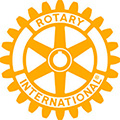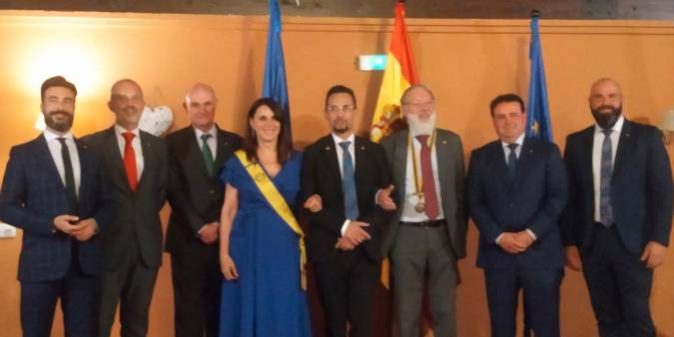The irruption of female leadership in spaces that seemed to belong to men reaches Rotarism in Seville. Three clubs out of six will have female presidents for the 2022/23 academic year
By Juan Carlos Arias.
There are too many clichés and misunderstandings about Rotary Clubs. There are those who think they are a variant of Freemasonry and those who point to the worst conspiratorial evils. This is a serious mistake; the operational transparency and lack of patrimony in Clubs where politics and religion are far removed from the debates disprove this.
Rotary was founded in Chicago (USA) in 1905 by the lawyer Paul Harris. Its idea was to rotate (hence its name) the sessions of its members, mutual aid and sharing, professional, educational, health, solidarity and community programmes. Its philosophy is telegraphic: to give of oneself, before thinking of oneself. The soul of Harris pulsates in the annual challenges that challenge the clubs, where every year they change the board of directors as proof of their democratic essence. Rotary International today is an organisation that operates in more than 200 countries in 35,000 clubs with almost 2,000,000 members. The Rotary Foundation, its charitable subsidiary, is the world’s largest NGO after the Red Cross and has invested almost 4 billion euros from private donations. Its programmes exchange professionals between countries, provide scholarships to thousands of university students, prevent pathologies and conflicts, attend catastrophes and train for world peace, as well as teaching literacy and eradicating polio through community development.
Rotarianism arrived in Spain more than 100 years ago. In 1920, the first Club in continental Europe was established in Madrid. In June 1927 the first Club in Seville was founded. A few years later, from 1930, it met at the Hotel Alfonso XIII. At that time, District 60 brought together clubs from mainland Spain, the Canary Islands, the Balearic Islands and the Moroccan Protectorate. The Sevillian notary José Gastalver Gimeno became District Governor. In August 1936, General Franco suspended the Rotarians’ solidarity activity because he considered it subversive, although his brother Nicolás was a Rotarian.
After the forced pause and persecution that the fratricidal war (1936-39) brought to Rotary, the Sevillian Club was re-founded in 1979. The Constitution of the previous year and the first democratic elections returned the Club to the same Hotel where it met before the war. The legendary Alfonso XIII once again wore the Rotary cogwheel.
Little by little more than 200 Sevillians have joined Rotarismo. They are grouped into six Clubs, all based in the capital of the Giralda in different locations. At the end of the nineties there was a Club in Alcalá de Guadaira. It met in the Zambra restaurant and was promoted, among other local personalities, by the late psychiatrist and Lieutenant Colonel José Luis Moreno Chaparro. The adventure lasted only a few years. The initial idea of the Club was to welcome women on the refusal of the then only Rotary Club. This organisation promoted – paradoxically – equality and solidarity. Those were different times. Fortunately, the 21st century has changed things.
Sevillian Rotarians are important on the Spanish scene. After Gastalver as District Governor, he was succeeded by the economist José Luis Carvajal and the engineer Pedro Valenzuela. For the academic year 2024-25, Dimas Rizzo Escalante was elected Governor. He was a prestigious agronomist engineer who for years had tenaciously defended the interests of Andalusia and Spain before the European Economic Community in Brussels, as well as presiding -later on- a cotton employers’ association.
Today, the six Seville Rotary Clubs welcome the talent and courage of women into their ranks. In 2022-23 half of the local clubs (Cartuja, Seville and International) will have new presidents. We are convinced that they will put their stamp on developing solidarity programmes, increasing membership and making visible to society the unique grain of sand that the Rotary movement brings.
The new President
A Sevillian Club, Sevilla International (RCSI) is in session at the Gran Meliá Colón. Last night it hosted the brilliant ceremony of the change of presidency. It was held at the Real Club de Golf de Montequinto. Five new members were also presented with badges.
Lawyer Antonio Barba Gálvez handed over the distinctive necklace to businesswoman Ana Garrido. An intense round of applause, due to his proactivity, energy, charisma plus the hard times the pandemic brought to the Club, saw Barba off from his post. Afterwards, heartfelt words from Garrido appealed to his personal commitment. He stressed that nothing would be the same without the cooperation of the more than 30 members and their new posts (Sebastián Morales, Secretary; Gerardo Martínez, Treasurer and Pedro G. Díaz, Macero).
Founded in 2019, the youngest Club de los Sevillanos has managed to reinvent itself after initial incidents that almost closed it down. The pandemic endorsed virtual sessions, while continuing to develop solidarity projects that helped relatives of Alzheimer’s patients in Lepe (Huelva), host entrepreneurs or interact with other groups and initiatives (The Hub-TM, Toastmasters, Impúlsame-Mairena del Alcor, Plus Vitech) to contribute and add synergies that combine social, business and solidarity meeting points.
Since the beginning of the invasion of Ukraine last February by Russia, the RCSI has shown its solidarity. It sent volunteers to FIBES, collaborated with collections in brotherhoods and financed – with an important donation – the trip of a convoy with aid to a country, Ukraine, which is suffering the worst of wars.
One of the RCSI’s flagship projects is the cooperation with ATMOS, the first Andalusian welfare collective for bone marrow transplant recipients. The Club, through several members, witnessed the successful presentation of the collective at the EOI headquarters, which had postponed the pandemic, provides membership fees and encourages initiatives in the fight against leukaemia and the recovery of transplant recipients. The victims of this cancer deserve all the help they can get.
The complicity of the RCSI-ATMOS is conveyed by one of the Club’s new members, José Manuel Soria, CEO of Ingemont. He already indicated, in 2018, to this Courier in its section Marking the entrepreneur a revealing corporate phrase: ‘our value is to be the family doctor for customers’.
Finally, we write a civic suggestion. It is appealed from these lines because donating blood is imperative. It is the most horizontal human solidarity; it involves sharing what one has over the philanthropy of giving what is left over. Seville needs 400 bags of blood every day. Men and women between the ages of 18 and 65 can donate. Women a maximum of 3 a year, men 4. To dispel the hoaxes, it is insisted that donating blood does not hurt, nor does it make you dizzy, nor does it bleed. On the contrary, it regenerates the bloodstream. Blood is a human tissue that cannot be artificialised. Reserves are at a minimum. It is therefore urgent to donate blood so that our hospitals and operating theatres remain open, so that women in labour do not bleed to death, and so that cancer patients, haemophiliacs, injured or assaulted patients can continue to live. This appeal, we insist, is urgent. The summer is already threatening the reserves of certain minority blood groups to be in short supply.
To be a better person is to help and share with our fellow human beings. Harris’ philosophy was not without echo in Seville. It is time to insist that donating blood costs nothing and does a lot of good. Those who give their arm for the life of others save three lives. Never forget that.
SOURCE: https://elcorreoweb.es/sevilla/ana-garrido-primera-presidente-de-un-rotary-club-sevillano-IL7951093








